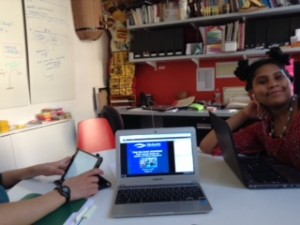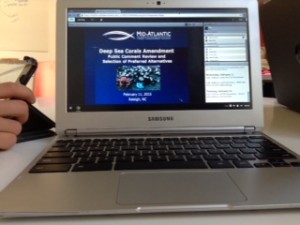No Water No Life created a petition to advocate for the passage of an amendment. I first learned about this amendment from an email that the Wildlife Conservation Society sent to my mom. It’s passage is being debated by the Mid-Atlantic Fishery Management Council (MAFMC). It is called the Deep Sea Corals Amendment to the Atlantic Mackerel, Squid, and Butterfish Fishery Management Plan. Its passage would ban all destructive bottom fishing techniques below a certain level in the zone off of the United States Mid-Atlantic coast. In this zone, there are 15 deep-sea canyons that contain coral reefs. The fish living in these canyons rely on deep-sea coral reefs for shelter and safety. They serve as nurseries for fish in that they are a safe haven for fish to breed and for baby fish to safely live. Fish, especially small fish, naturally congregate towards the structure such as that which these deep-sea corals provide, because structure keeps them safe. These deep-sea corals are thousands of years old – amongst the oldest living creatures on earth – and take hundreds of years to grow. These corals are in danger because of fishing gear such as trawl nets, which are large, weighted nets that are towed through deep water in order to collect marine life such as fish and squid. With advancing technology, these nets have access to deeper water, and are in danger of scraping along the ocean floor to get the squid that congregate in shoals, and near structure such as coral. If this fishing is allowed in these deep zones, these precious corals would be destroyed. Corals are already in severe danger, and 40% of the world’s coral has already been destroyed, and I felt compelled to advocate for saving what’s left. On January 18th, I created a petition on Change.org to show the public appeal to pass the Amendment in order to protect coral. I was planning to collect as many signatures as possible, and convey this to the MAFMC. In the description of the petition on its website, I wrote the following:
“There are deep canyons at the bottom of the ocean off the U.S. Mid-Atlantic coast, teeming with marine creatures as well as deep-sea corals that are hundreds of years old. Some of these corals are even thousands of years old; amongst the oldest living creatures on earth. These corals are in danger from commercial fishing.
“In a process of commercial fishing known as bottom trawling, boats drag heavy, weighted nets along the ocean floor, destroying corals as they go. Fishing gear like bottom trawl nets destroy in minutes the coral that took nature centuries to build.
“When that happens, the marine creatures that depend on coral reefs are left vulnerable as well. Coral reefs provide structure and a habitat for diverse marine life, are nurseries for fish, and are essential for the health of the entire ocean.
“40% of coral worldwide have already been destroyed.
“The coral off the U.S. Mid-Atlantic coast can easily be saved, if we act NOW.
“The Mid-Atlantic Fisheries Management Council, which regulates fishing in these waters, is considering an amendment called the “Deep Sea Corals Amendment to the Atlantic Mackerel, Squid, and Butterfish Fishery Management Plan”. It will protect coral in the following 3 ways:
“1. By banning all destructive bottom fishing in the 15 Deep-Sea Canyons on the U.S. Mid-Atlantic coast; home to many deep-sea corals.
“2. By banning the use of bottom-fishing gear deeper than 200 meters below sea-level
“3. By providing means to enforce these restrictions.
“With this amendment, the Council will protect an estimated 73% of documented corals off the Mid-Atlantic coast.
“This is our chance to protect deep-sea corals and the marine life that depends on them! Let’s encourage the Council to seize this opportunity become a global leader in the protection of deep-sea coral by passing this amendment and implementing these management measures.
“January 28 is the final day for comments, but every signature counts until they make a decision, sending the Council a clear message from those of us who value marine life and deep-sea corals and want to see them protected. Sign this petition to say “NO!” to destructive bottom fishing and show your support for deep-sea coral conservation.
“Sign this petition now to show the Council your support for the amendment!
“Thank you,
“Daniela Pierro, Kiyomi Johnson, Kai Tsurumaki
“No Water, No Life”
As soon as the petition was created, I sent a link and short description to my phone and email contacts, and emailed it to anyone I thought may be interested. Over the next few days, I sent it to my school community, and church community. Over this period of time, I collected about 200 signatures. I was also in correspondence with Noah Chesnin, whom I am very grateful to because of all of the support, help and guidance that he offered. On 1/20/15, beginning at 7:00 PM, my group and I attended a webinar: an online streaming of a council meeting. We gathered at my house, and attended using computers for the visuals and calling in on phones for the audio. There was an explanatory presentation shown, and then the meeting was opened up for public comment. We were given the opportunity to speak. I spoke, representing my group, and explained the goals of our group, the purpose of our petition, and strongly encouraged them to listen to the public outcry to, by all means possible, protect the maximum amount of deep-sea corals by choosing the shallowest boundary. Below is the transcript of what I stated during this public hearing, which was recorded:
Daniela Pierro – 8th grader at LREI, the Little Red Schoolhouse, NYC
“I am a part of a social justice group which we call “No Water, No Life” and we’re focusing on water issues, especially coral destruction. Recently, we created a petition on change.org. Its goal was to see how strong public support of the amendment is. We found that many people strongly support the passage of the amendment to conserve corals. We published the petition on Sunday, and in 3 days, the petition has gained over 200 signatures. The people who signed were showing their support for the conservation of deep sea corals and for management measures in both broad and discrete coral zones, and for the 200 meter depth to be implemented, and to prohibit all bottom fishing gear.
“The signers of the petition also acknowledged that it was important for these measures to be enforced. We strongly encourage you to pass the Deep Sea Corals Amendment to the Atlantic Mackerel, Squid, and Butterfish FMP. We will send in the petition on the 28th to show you the amount of signatures it will have acquired by then. We strongly encourage you to listen to the many voices of the concerned public.”
Shortly after this meeting, I received a call from a staff member of Change.org, who was wondering what I would do with the petition once I had reached the deadline I had specified. He had noticed that it was trending, and offered to send it to people all over the U.S.. He also offered some helpful advice, including to add an image in order to increase its chances of gaining signatures. I was thrilled to hear this, and immediately followed his advice. He also advised that, even after the period for public comment was closed, I should keep the petition up and running to see how many signatures it would collect. This proved to be a very successful strategy, as signatures began to build exponentially, and by January 27th it had gained 824 signatures, after circulating for only 9 days. I sent an email to each of the individual Council members to update them on the petition’s progress, including a link to the petition, and to continue to encourage them to pass the Amendment. I received replies from 5 members of the MAFMC: Dewey Hemilright, Jeff Deem, John McMurray, Stewart Michels, and Rick Robins. We were invited by Richard Robins, the Council Chairman, to attend the online streaming of the meeting to vote on the Amendment. The publicity of the petition escalated unbelievably that night, and by January 28th it had achieved 2,447 signatures, and counting! I was over the moon with astonishment and happiness. I emailed Kiley Dancy, a staff member of the MAFMC who had been coordinating the public comment, informing her of the public’s escalating response, and asking her to convey this to the Council. On February 11th, No Water No Life and I attended the online streaming of the Council’s meeting to take up the issue.

“No Water No Life” attended the meeting in our principal, Mark Silberberg’s, office. Kiyomi Johnson is on the right, and the hands on the left belong to Kai Tsurumaki.
They did not make the final vote during this meeting, but they voted on the steps that they take moving forward. We were not allowed the opportunity to make a public comment during this meeting. On February 10, there was an article in the New York Times about the decision of the MAFMC. John McMurray was cited in the article, stating that it is clear that the public wants the corals protected.
Moving forward, I will follow up with Noah Chesnin, to thank him for all of his help and support of my efforts throughout this process. I will also continue to advocate to ensure strong protections for deep-sea corals by continuing to circulate and add to the petition. This is because it will be reconsidered by several other people, including the Secretary of Commerce, for the final decision.
I learned many things from this fieldwork. I learned, through practice, how to write a persuasive, polite email that conveys what I mean for it to convey. I learned how to write and create a successful petition, and the people skill needed in order to circulate it effectively. I learned about the Council process, and about how it makes its decisions. I learned how to speak effectively at a webinar. This fieldwork took the most amount of time and effort, and I really put my whole heart into it. I believe that this, out of all of the fieldwork that No Water No Life has done so far, has made the most impact in the real world.
There are so many people to thank, who have helped me to bring this petition to success. Thank you, all!
Daniela Pierro
A link to the petition:






